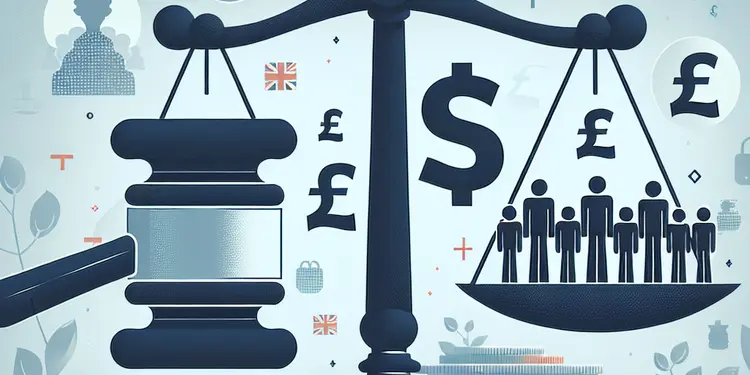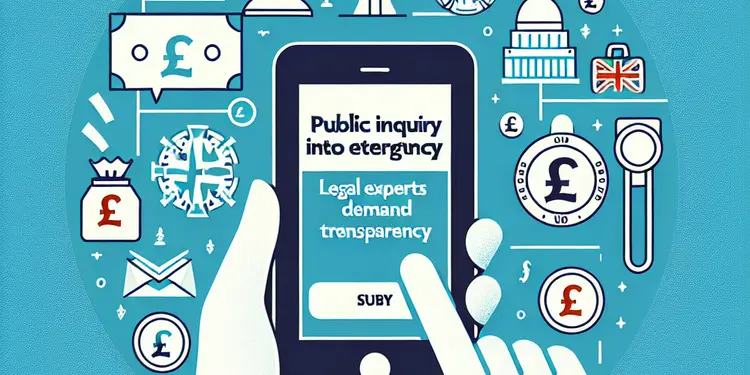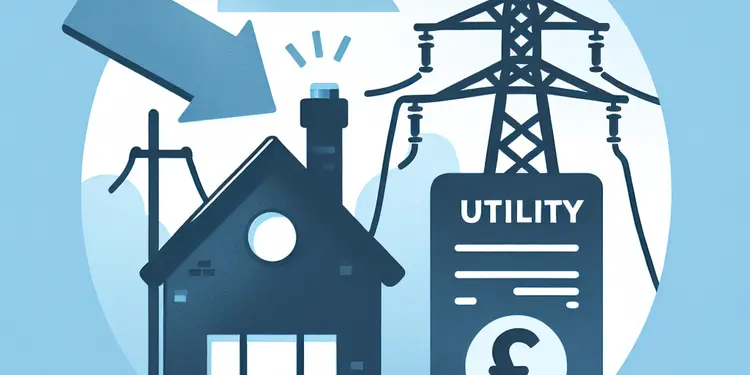
Find Help
More Items From Ergsy search
-

Legal Experts Warn of Consequences in Upcoming AI Regulation Bill
Relevance: 100%
-

Government Faces Legal Challenge Over Proposed Immigration Bill
Relevance: 44%
-

Public Inquiry into States of Emergency: Legal Experts Demand Transparency
Relevance: 39%
-

Is it legal to import ketamine?
Relevance: 30%
-

Is CBD legal?
Relevance: 30%
-

Is ketamine legal?
Relevance: 30%
-

Is the production of ketamine regulated?
Relevance: 29%
-

Is cannabis extract legal?
Relevance: 29%
-

What are the consequences of dangerous driving?
Relevance: 29%
-

How can I ensure my solution is within legal boundaries?
Relevance: 29%
-

How does the involvement of expert witnesses impact the timeline of a case?
Relevance: 29%
-

What are the consequences for banks not complying with transparency standards?
Relevance: 29%
-

Can an inheritance tax bill be challenged or appealed?
Relevance: 29%
-

Is cryptocurrency legal?
Relevance: 28%
-

What factors influence the rise and fall of energy bills in the UK?
Relevance: 28%
-

When will energy bills come back down in the UK?
Relevance: 28%
-

Are there any changes to spousal support regulations in 2026?
Relevance: 28%
-

What are the potential consequences for a company that fails to recall a dangerous product?
Relevance: 27%
-

Are energy prices regulated in the UK?
Relevance: 27%
-

What should I do if my energy bill is unexpectedly high?
Relevance: 26%
-

What is the legal status of ketamine in Canada?
Relevance: 26%
-

What are the consequences of having an eviction on my record?
Relevance: 26%
-

What is the role of a water regulator in my claim?
Relevance: 26%
-

What evidence should I gather if I plan to seek legal action?
Relevance: 26%
-

Does the energy price cap guarantee my total bill?
Relevance: 25%
-

Are there regulations on transporting the body before the funeral?
Relevance: 24%
-

What are the social consequences of binge drinking?
Relevance: 24%
-

Are there any legal restrictions on caffeine pouches?
Relevance: 24%
-

Are there government programs that help with utility bills?
Relevance: 24%
-

Can I get help negotiating bills with service providers?
Relevance: 24%
-

Are there specific regulations for ground burials in the UK?
Relevance: 24%
-

How does the energy price cap affect my energy bills?
Relevance: 24%
-

Are there apps that help manage and reduce household bills?
Relevance: 24%
-

Can ketamine be used for recreational purposes legally?
Relevance: 24%
-

Are there legal guidelines for sewage discharge into UK waters?
Relevance: 23%
-

Where can I get a copy of my Council Tax bill?
Relevance: 23%
-

Can seniors receive help with their energy bills?
Relevance: 23%
-

Where can I get help in managing my household bills?
Relevance: 23%
-

Are woodland burials legal in the UK?
Relevance: 23%
-

Have any legal challenges been made against the social media ban?
Relevance: 23%
Introduction
The UK government is poised to introduce a new AI Regulation Bill aimed at addressing the burgeoning influence and application of artificial intelligence across industries. Legal experts, however, are cautioning about the potential consequences of the proposed legislation. Their concerns highlight both the necessity of the bill in protecting public interests and the potential pitfalls that could stifle innovation and competitiveness.
The Need for Regulation
AI technologies are rapidly becoming integral to sectors including healthcare, finance, and transportation. As AI systems evolve, they raise significant ethical, privacy, and security questions that existing laws do not adequately address. The upcoming AI Regulation Bill seeks to establish a framework that ensures AI systems are developed and deployed responsibly. It aims to protect individuals' rights and prevent discriminatory practices while promoting transparency and accountability.
Legal Experts' Concerns
Despite the bill's intentions, legal experts warn that overly stringent regulations could negatively impact the UK’s AI industry. They argue that excessive red tape may limit innovation by imposing high compliance costs on startups and small enterprises. This could hinder their ability to compete with larger, international companies that might not face similar restrictions. Furthermore, experts caution that the regulatory framework needs to be flexible to keep pace with the rapid advancements in AI technology.
Potential Economic Impact
The regulation could have broader economic implications. Experts fear that if businesses perceive the regulatory environment as too constrictive, they may relocate their AI research and development activities to countries with more favourable conditions. This could result in a loss of talent and investment for the UK, potentially diminishing its standing as a global leader in AI innovation.
Balancing Innovation and Protection
Legal experts emphasize the importance of striking a balance between fostering innovation and ensuring public safety and ethical standards. They suggest that the legislation should include provisions for regulatory sandboxes, which would allow companies to test AI products in a controlled environment before full-scale deployment. Additionally, regular consultations with industry stakeholders and continuous updates to the regulation could help maintain this balance and ensure relevance.
Moving Forward
As the AI Regulation Bill moves through the legislative process, it will undoubtedly undergo scrutiny and likely revisions. Legal experts agree that collaboration between government, industry, and civil society will be crucial in crafting a law that protects public interests without stifling technological advancement. Ensuring that the UK remains at the forefront of AI development will require a thoughtful approach that encourages innovation while safeguarding against risks.
Conclusion
The upcoming AI Regulation Bill represents a significant step in confronting the challenges posed by artificial intelligence. While the legal community acknowledges the necessity of regulation, the potential consequences of the bill warrant careful consideration. Achieving the right regulatory balance will be critical to sustaining the UK’s leadership in the global AI arena.
Introduction
The UK government is planning a new rule, called the AI Regulation Bill. This rule is about how computers that think (AI) are used in different jobs. Experts who know about laws are worried. They think the rule is important to keep people safe, but it could also make it hard for new things to be created.
The Need for Regulation
AI is being used more in places like hospitals, banks, and transport. As AI gets better, we have questions about right and wrong, privacy, and safety that old laws do not answer. The new AI rule wants to make sure AI is safe and fair. It will protect people's rights and stop unfair treatment. It also wants people to know how AI makes decisions.
Legal Experts' Concerns
Experts who know the law think the new rule might be too strict. They say too many rules could make it hard for UK companies to come up with new ideas. Small companies might find it hard to pay for all the rules. This could stop them from competing with big companies in other countries. The experts want the rules to be flexible because AI changes fast.
Potential Economic Impact
The rules might also affect the economy. If companies think the rules are too hard, they might move their AI work to other countries with easier rules. This could mean fewer jobs and less money for the UK. It could also mean the UK is not a leader in new AI ideas.
Balancing Innovation and Protection
Experts say it’s important to find the right mix of making new things and keeping people safe. They think companies should be able to test AI in special zones where it's safe to try new things. Talking with people in the industry and changing the rules regularly could help keep this balance.
Moving Forward
As the new AI rule is talked about more, it will probably change. Experts say that for the rule to work, the government, businesses, and the public need to work together. They want the UK to keep making new AI things while keeping people safe.
Conclusion
The new AI Regulation Bill is a big step in solving problems with AI. Even though experts agree the rule is needed, they worry about what might happen. It’s important to make sure the rules protect people but also let new ideas grow. This will help the UK stay a leader in AI.
Frequently Asked Questions
What is the AI Regulation Bill?
The AI Regulation Bill is a proposed set of laws aimed at governing the development, deployment, and use of artificial intelligence technologies.
Why do legal experts warn about consequences in the upcoming AI Regulation Bill?
Legal experts warn that the bill could have unintended consequences on innovation, privacy, and the competitive landscape for AI technologies.
What are the potential impacts of the AI Regulation Bill on innovation?
Experts fear that strict regulations could hinder innovation by imposing heavy compliance burdens on developers, leading to slower advancement in AI technologies.
How might the AI Regulation Bill affect startups and smaller companies?
Startups and smaller companies might find it more challenging to comply with stringent regulations, which could limit their ability to compete with larger, well-resourced firms.
Could the AI Regulation Bill influence international competitiveness?
Yes, legal experts suggest that overly restrictive regulations could disadvantage domestic companies in the global AI market, affecting international competitiveness.
What are some privacy concerns associated with the AI Regulation Bill?
There are concerns that the bill may not adequately address privacy issues inherent in AI systems, potentially leading to misuse of personal data.
How does the AI Regulation Bill plan to address ethical concerns in AI?
The bill proposes guidelines for ethical AI development, including fairness, transparency, and accountability, but the specifics are still under discussion.
What penalties are proposed in the AI Regulation Bill for non-compliance?
The bill outlines financial penalties and potential operational restrictions for companies that fail to comply with the regulations.
Will the AI Regulation Bill impact consumer access to AI technologies?
There is a possibility that consumers could face reduced access to emerging AI technologies if companies are reluctant to launch products due to regulatory constraints.
What role do public consultations play in shaping the AI Regulation Bill?
Public consultations allow stakeholders, including industry leaders and the general public, to provide input and feedback on the proposed regulations, helping to ensure they are balanced and effective.
Are there any existing models for AI regulation that the bill is based on?
The bill may draw on existing models such as the EU's GDPR for data protection and other global regulatory frameworks for AI and emerging technologies.
How will transparency in AI systems be enforced under the new regulations?
The regulations may require companies to disclose algorithms, data sources, and decision-making processes to ensure transparency in AI systems.
Will the AI Regulation Bill address biases in AI algorithms?
Yes, eliminating biases in AI algorithms is one of the objectives, with regulations likely requiring developers to test and mitigate biases in their systems.
What is the anticipated timeline for the implementation of the AI Regulation Bill?
The timeline is uncertain, as it depends on legislative processes, but experts estimate implementation could begin within a few years of the bill's approval.
How might the AI Regulation Bill impact job creation in the tech sector?
While there may be new opportunities for regulatory compliance roles, there is also concern that burdensome regulations could slow job growth in the tech sector.
What are the enforcement mechanisms proposed in the AI Regulation Bill?
Enforcement may include government oversight bodies, regular audits, and potential penalties for companies that do not comply with the regulations.
How does the bill propose balancing innovation with regulation?
The bill seeks to balance innovation and regulation by providing clear guidelines that protect public interests while allowing room for technological growth.
What role do international standards play in the AI Regulation Bill?
The bill may align with international standards to ensure consistency across borders, facilitating smoother cross-border technology deployment and collaboration.
Are there exemptions or special considerations in the AI Regulation Bill for certain sectors?
Certain sectors, like healthcare or defense, might have specific provisions or exemptions due to the critical nature of their applications of AI.
How can companies prepare for the upcoming AI regulations?
Companies can prepare by conducting impact assessments, investing in compliance training, and staying informed about legislative developments related to AI regulation.
What is the AI Regulation Bill?
The AI Regulation Bill is a set of rules. These rules are for using Artificial Intelligence (AI).
Think of AI as smart computer programs. These programs can help with many things, like talking to your phone or playing games.
The rules make sure that AI is safe and fair for everyone.
If you want help reading, you can:
- Ask someone to read it with you.
- Use tools that read the text out loud.
- Take your time and read slowly.
The AI Regulation Bill is a plan for new rules. These rules are about how we make and use computers that can think and learn by themselves.
Why are lawyers worried about the new AI law?
Some smart people who know about laws (lawyers) are worried about a new rule about AI (computers that think like people).
The new rule might bring changes, and some people think this could be bad.
If you want help reading or understanding this, you can ask someone to read it with you. You can also use screen readers or voice assistants.
Smart people who know about the law say the new rules might cause problems. These problems could make it harder to create new things, keep personal stuff private, and make it tough for different AI companies to compete with each other.
How might the AI Regulation Bill change new ideas and inventions?
Experts worry that having too many strict rules might make it hard for people to create new things. These rules can make it tough for developers because they have to follow lots of steps. This could slow down the progress in making AI technologies better.
To help understand, you can use tools like text-to-speech to listen instead of reading. Also, breaking the text into shorter sentences and using a dictionary for hard words might help.
How might the AI Regulation Bill affect new and small businesses?
The AI Regulation Bill is a set of rules about using AI (artificial intelligence), like computers and robots that can learn and make decisions. These rules might change how new and small businesses work.
- Extra Work: New rules might mean more things that businesses need to do. Small businesses might need help understanding and following these rules.
- Costs: Following rules might cost money. Small businesses might need to spend more on tools or people to help them.
- Help and Tools: Small businesses can use tools to help, like simple guidebooks, videos, or asking experts for advice.
These rules aim to make sure AI is used safely and fairly.
New and small companies might have a harder time following strict rules. This can make it tough for them to compete with big companies that have more money and resources.
Will the AI Rules Affect How Countries Compete?
Rules about AI might change how countries do business with each other.
Here are some things to help:
- Use simple guides and videos to learn more.
- Ask someone to explain the hard parts.
- Take notes to help remember.
- Talk with friends about what you learn.
Yes, some smart people in law think that too many rules could make it harder for companies here to compete with companies from other countries that use AI.
You can use tools like audio books to help understand or read text better. Pictures can also help explain ideas.
What are some privacy worries about the AI Regulation Bill?
People are worried about the new bill. It might not protect our personal data very well when we use AI. This means our private information could be used in the wrong way.
What will the AI Regulation Bill do to solve problems with fairness and safety in AI?
The AI Regulation Bill is a set of rules. These rules aim to make sure AI is fair and safe for everyone. People are worried that AI might not always be fair or could be unsafe. This bill will help make sure AI works in a way that is good for people.
Here are some things the bill might do:
- Make sure AI is fair to everyone.
- Check that AI is safe and does not harm people.
- Set up tests to see if AI is working right.
- Make rules for companies who create AI to follow.
- Help teach people how to use AI safely.
Tools that might help understand this more:
- Use pictures or diagrams to show ideas.
- Talk to someone who can explain it.
The new bill wants to make rules for building AI technology. The rules should make sure AI is fair, easy to understand, and responsible. But, people are still talking about the details.
What happens if someone breaks the rules in the AI Regulation Bill?
The new rules say that companies might have to pay money if they do not follow the rules. The rules might also stop companies from doing some of their work.
Will the new AI rules change how people use AI?
People might not be able to use new AI technology if companies are worried about rules and decide not to make new products.
How do public talks help make the AI Law?
Public talks are when people share their ideas and opinions.
These talks help make the AI Law better.
People can say what they like or do not like about the law.
It helps to use simple words and think clearly.
If you need help, try using pictures, videos, or talking to someone you trust.
Public consultations let people, like industry leaders and the public, share their thoughts and ideas about new rules. This helps make sure the rules are fair and work well.
Does the bill use any examples for AI rules?
The new rules might use ideas from things like the EU's GDPR, which helps keep data safe, and other world rules about AI and new tech.
How will new rules make AI systems clear and easy to understand?
Rules might ask companies to share how their AI works. They could need to show the computer program (called an algorithm), where they get their information from, and how they make choices. This helps make sure everything is clear and understandable.
Will the AI Law Fix Unfairness in AI?
The AI Law is a set of rules. It is made to help make AI fair. Sometimes, AI can be unfair. This happens because of bias. Bias means not treating everyone the same.
The AI Law is here to stop this. It wants to make AI fair for everyone. This means no one gets left out or treated differently.
To help understand more, tools like picture charts can be useful. Ask someone to explain tricky words. Use simple examples to learn better.
Yes, we want to remove unfairness in AI systems. Rules will probably make developers check their AI systems and fix any unfairness.
When will the AI Regulation Bill start?
No one is sure when this will happen. It depends on how fast the people who make the laws work. Experts think it might start a few years after the law is agreed on. Using a calendar to track dates and hoping for updates from the news can help keep track of progress.
How will the AI Regulation Bill change jobs in tech?
The AI Regulation Bill is a new set of rules.
These rules are about how we can use computers and robots (AI).
This might change how many jobs are made in technology.
If rules are too hard, some tech jobs might go away.
If rules are fair, it could help make more tech jobs.
Use tools like spell checkers to help read tricky words.
You can ask someone to explain if you need help.
There might be new jobs to help follow rules, but people worry that too many rules could slow down job growth in tech.
Here are some tools to help you read:
- Use a ruler or your finger to follow each line.
- Break the text into smaller parts.
How will the rules in the AI Regulation Bill be followed?
This question is asking about how people will make sure everyone follows the rules in the AI Regulation Bill.
Here is a simple way to understand:
- The Bill is a set of rules for using AI safely.
- "Enforcement mechanisms" are ways to check and make sure these rules are followed by everyone.
- This might include checks, like people inspecting to see if AI is being used correctly.
- It can also mean there are consequences if people do not follow the rules.
To help understand the Bill better, you might:
- Use simple language summaries.
- Have someone explain the rules to you with examples.
- Use pictures or videos that show how the rules work.
There are people who check that companies follow the rules. These people might work for the government. They check by doing regular inspections. If companies do not follow the rules, they might be punished.
How does the new rule plan to keep new ideas safe and fair?
This new rule wants to keep things fair. It wants to help new ideas and keep people safe at the same time. It tells us how to do this. It lets new technology grow but still protects everyone.
How do international rules help with the AI Regulation Bill?
The bill helps different countries work together better. It makes sure that everyone follows the same rules. This makes it easier for countries to share new technology and work together.
Does the AI Regulation Bill have special rules for some areas?
The AI Regulation Bill might have special rules for certain areas or jobs. This means that in some cases, the rules might be different.
If you find it hard to understand, you can use tools to help read and listen to it at the same time.
Some jobs, like taking care of people or keeping the country safe, might have special rules. This is because they use AI in important ways.
How can companies get ready for new AI rules?
Here are some easy ways for companies to get ready:
- Learn about the new rules. They will help guide how AI can be used.
- Talk to experts. They can explain what the rules mean.
- Make a plan to follow the rules. This means checking your AI tools often.
- Train your team. Everyone should understand the new rules.
Tools or techniques that can help:
- Use simple checklists to track your progress.
- Find online videos that explain the rules in simple words.
- Join a group or club that talks about AI and these rules. Sharing ideas can help!
Companies can get ready by doing a few things:
1. Look at how AI rules might affect them.
2. Spend money to teach staff about following the rules.
3. Keep up to date with new AI laws.
Tools like simple checklists and reminders can help.
Useful Links
This website offers general information and is not a substitute for professional advice.
Always seek guidance from qualified professionals.
If you have any medical concerns or need urgent help, contact a healthcare professional or emergency services immediately.
- Ergsy carfully checks the information in the videos we provide here.
- Videos shown by Youtube after a video has completed, have NOT been reviewed by ERGSY.
- To view, click the arrow in centre of video.
- Most of the videos you find here will have subtitles and/or closed captions available.
- You may need to turn these on, and choose your preferred language.
- Go to the video you'd like to watch.
- If closed captions (CC) are available, settings will be visible on the bottom right of the video player.
- To turn on Captions, click settings .
- To turn off Captions, click settings again.
More Items From Ergsy search
-

Legal Experts Warn of Consequences in Upcoming AI Regulation Bill
Relevance: 100%
-

Government Faces Legal Challenge Over Proposed Immigration Bill
Relevance: 44%
-

Public Inquiry into States of Emergency: Legal Experts Demand Transparency
Relevance: 39%
-

Is it legal to import ketamine?
Relevance: 30%
-

Is CBD legal?
Relevance: 30%
-

Is ketamine legal?
Relevance: 30%
-

Is the production of ketamine regulated?
Relevance: 29%
-

Is cannabis extract legal?
Relevance: 29%
-

What are the consequences of dangerous driving?
Relevance: 29%
-

How can I ensure my solution is within legal boundaries?
Relevance: 29%
-

How does the involvement of expert witnesses impact the timeline of a case?
Relevance: 29%
-

What are the consequences for banks not complying with transparency standards?
Relevance: 29%
-

Can an inheritance tax bill be challenged or appealed?
Relevance: 29%
-

Is cryptocurrency legal?
Relevance: 28%
-

What factors influence the rise and fall of energy bills in the UK?
Relevance: 28%
-

When will energy bills come back down in the UK?
Relevance: 28%
-

Are there any changes to spousal support regulations in 2026?
Relevance: 28%
-

What are the potential consequences for a company that fails to recall a dangerous product?
Relevance: 27%
-

Are energy prices regulated in the UK?
Relevance: 27%
-

What should I do if my energy bill is unexpectedly high?
Relevance: 26%
-

What is the legal status of ketamine in Canada?
Relevance: 26%
-

What are the consequences of having an eviction on my record?
Relevance: 26%
-

What is the role of a water regulator in my claim?
Relevance: 26%
-

What evidence should I gather if I plan to seek legal action?
Relevance: 26%
-

Does the energy price cap guarantee my total bill?
Relevance: 25%
-

Are there regulations on transporting the body before the funeral?
Relevance: 24%
-

What are the social consequences of binge drinking?
Relevance: 24%
-

Are there any legal restrictions on caffeine pouches?
Relevance: 24%
-

Are there government programs that help with utility bills?
Relevance: 24%
-

Can I get help negotiating bills with service providers?
Relevance: 24%
-

Are there specific regulations for ground burials in the UK?
Relevance: 24%
-

How does the energy price cap affect my energy bills?
Relevance: 24%
-

Are there apps that help manage and reduce household bills?
Relevance: 24%
-

Can ketamine be used for recreational purposes legally?
Relevance: 24%
-

Are there legal guidelines for sewage discharge into UK waters?
Relevance: 23%
-

Where can I get a copy of my Council Tax bill?
Relevance: 23%
-

Can seniors receive help with their energy bills?
Relevance: 23%
-

Where can I get help in managing my household bills?
Relevance: 23%
-

Are woodland burials legal in the UK?
Relevance: 23%
-

Have any legal challenges been made against the social media ban?
Relevance: 23%


